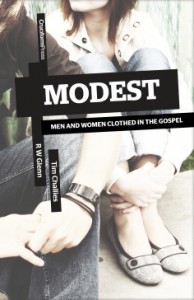Book Review: Modest Speaks to Guys, Too
 A Supreme Court justice, pressed to give a standard for “obscenity,” concluded, “I know it when I see it.” That’s part of the problem with the matter of immodesty – how to define it? Much of it is a reflection of the community we live in. Standards were very different where we lived in California than they were in the Carolinas where we grew up, and modesty in Florida was another matter as well. You just may have to judge for yourself. And we all know about immodesty, don’t we?
A Supreme Court justice, pressed to give a standard for “obscenity,” concluded, “I know it when I see it.” That’s part of the problem with the matter of immodesty – how to define it? Much of it is a reflection of the community we live in. Standards were very different where we lived in California than they were in the Carolinas where we grew up, and modesty in Florida was another matter as well. You just may have to judge for yourself. And we all know about immodesty, don’t we?
But we probably don’t know all about immodesty. It’s not about fashions, really.
Tim Challies and R.W. Glenn take an unexpected direction with the subject in their new book, Modest: Men and Women Clothed in the Gospel. Rather than focusing on hemlines and necklines and whether fabric is too clingy, they say the issue is rooted in our understanding of the Gospel. How does our self-presentation show our love for our neighbor and our love for Christ?
Modesty isn’t rigidly defined in Scripture, they point out, and once we’ve covered our nudity, the focus is on appropriateness. Immodesty is an unrighteous attempt to draw attention to ourselves, and furthermore, is an attempt to substitute human praise for fulfillment in Christ. What’s more, our immodesty may be leading our neighbor into sin–not just lust, but other sins like anger, discontent, pride, or gossip.
The fullness of the issue is not about women’s dress, nor men’s either, though we can’t ignore either one. It’s about the attitude of the heart, and it involves your speech and behavior as well as your attire.
For instance, it’s easy to criticize the cut of a girl’s skirt or blouse, but there are more subtle things going on among men. Sure, some may sport a tailored look to show off the results of their gym habits, but men are also likely to dress or behave in a way to signal “success” or “style” or “power.” Think how often the beautiful woman is seen with an unprepossessing man–in photographs. He may be manipulating her attentions in a different way, hard to capture in a still picture. The man who talks too boldly and seeks center stage when he’s truly a minor part of the gathering is carrying on no differently than the woman in church whose dress leaves little to the imagination.
The authors point out that we err on both extremes. Some of us may act as though dowdiness is next to godliness, and offend our neighbor with a haughty display of piety. Dressing aggressively downward to communicate your self-righteous overthrow of stuffy dress codes in the name of Christ may be your own self-made religion, an appearance of godliness but denying the real thing.
Challies and Glenn give a very balanced presentation, keeping to the center of the roadway and not diving for the ditches of legalism on the one side or lawlessness on the other. By digging into the roots of why we behave this way, rather than just swinging at the branches and fruits that grow from it, they are putting a finger on the heart problem rather than the dress problem. It’s a short book but a lot to think about.
Modest is available direct from Cruciform Press; print is $8.45 and e-books start at $5.45.